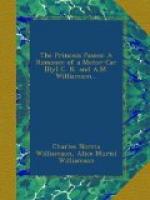With a sigh of relief the Little Pal jumped up from his grim task, leaving Joseph to fasten the straps; and as he got to his feet, his small hands purple with cold, I wrapped the dressing-gown round his shoulders. Then, seeing his slight figure engulfed in it, like a very small pea in a very big pod, I burst out laughing.
“Is that what you wanted?” cried the Boy. “I won’t have it. I won’t! I’d rather freeze than be a guy. Put it on yourself.”
“I don’t need it. It was for you. Don’t be ungrateful, after all my trouble.”
“All my trouble, you mean. Take off the horrid thing. I won’t wear it. Let me alone.”
Unmoved by his complaints, I still held him prisoner, using the dressing-gown as a strait-jacket, while he fought in my grasp. A sudden suppressed giggle from Innocentina at this juncture seemed to drive him to frenzy.
“If you don’t let me go, I’ll—I’ll box your ears!” he stammered.
“Try it,” I advised sternly.
He could not move his arms, so closely I held him, but his eyes were blazing.
“You’ll be sorry for this some day,” he panted.
“Will you keep on the dressing-gown, if I let you go?”.
“No.”
“Then will you wear my coat?”
“What! And have you in your shirt-sleeves? Rather not. Let me——”
“I’ll give you the coat and wear the dressing-gown myself. I’m not as vain as a girl.”
Whether the thought of what my appearance would be in the gown, or the taunt I flung at him, moved the Boy, I cannot say, but suddenly his struggles ceased.
“I’ll wear anything you like,” said he with a sudden accession of meekness, so unexpected that I was alarmed for his health, and gazed at him closely to see if he were on the verge of a collapse. Instead of looking ill, however, he was no longer pinched and pallid, but radiant with colour. Rage had produced a beneficial effect upon his circulation.
On his promise, I released him, nor did I insist when he waved me aside, and hurriedly girded up the dressing-gown himself. The garment reached almost to his feet, and the quaintness of the little figure shrouded in its dark folds and hatted with Panama straw, in the midst of a mountain snow-cloud, was a sight to make Fanny laugh; but I kept a grave face, and so did Joseph and Innocentina, though the donkey-girl’s eyes were bright.
We marched on again when Finois had been reloaded, the party keeping well together, lest we should lose each other in this mist which was snow, this snow which was mist. The Boy and I walked ahead at first; I silent lest I should laugh, he silent—probably—lest he should cry. The woolly cloud wrapped its folds round us thicker and closer, so that objects a dozen feet away were blotted out of sight, and for all practical purposes ceased to exist. The silvery rime, freezing as it fell, covered stones and boulders so that it was no longer possible to see the red splashes which marked the way. Soon, we were hopelessly lost, plunging down into grassy hollows, where our feet slipped between rough stones into muddy ruts concealed under a treacherous film of white, or plodding up to the top of knolls which proved to have no connection with anything else, when we had toilsomely attained them.




